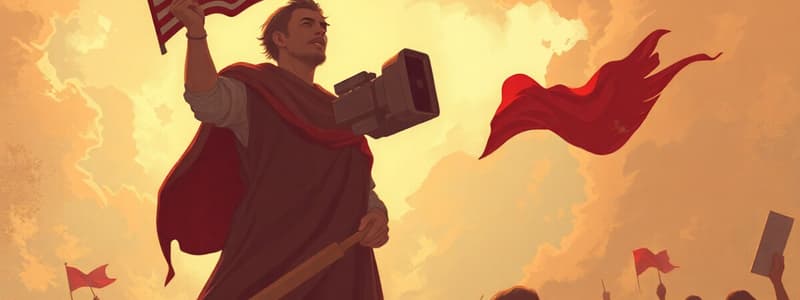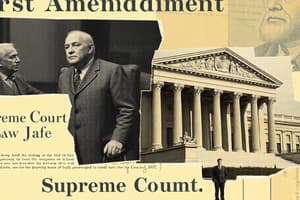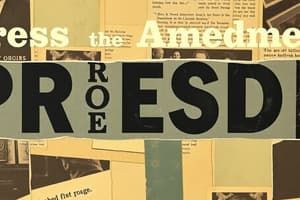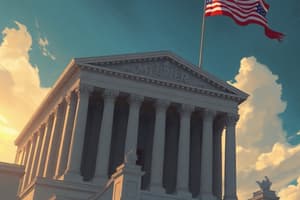Podcast
Questions and Answers
What essential role did the founding generation believe an independent press played in society?
What essential role did the founding generation believe an independent press played in society?
- To prevent corruption within the government (correct)
- To facilitate public debates
- To support political parties
- To promote government propaganda
What historical event significantly influenced the perception of press freedom among the founding generation?
What historical event significantly influenced the perception of press freedom among the founding generation?
- The signing of the Declaration of Independence
- The Zenger trial (correct)
- The Constitutional Convention
- The Boston Tea Party
Which act imposed restrictions on printed materials and contributed to the founding generation's view of press freedom?
Which act imposed restrictions on printed materials and contributed to the founding generation's view of press freedom?
- The Intolerable Acts
- The Townshend Acts
- The Declaratory Act
- The Stamp Act (correct)
What was the charge against John Peter Zenger that led to his imprisonment?
What was the charge against John Peter Zenger that led to his imprisonment?
What was the outcome of Zenger's trial that had lasting implications for press freedom?
What was the outcome of Zenger's trial that had lasting implications for press freedom?
Which of the following best defines 'libel' as referred to in the context of Zenger's trial?
Which of the following best defines 'libel' as referred to in the context of Zenger's trial?
What consequence did Zenger face for his critical publications before his trial?
What consequence did Zenger face for his critical publications before his trial?
Flashcards are hidden until you start studying
Study Notes
Freedom of the Press
- The First Amendment protects the right of journalists and news outlets to report on government leaders and activities.
- The Founding Fathers believed an independent press was essential to prevent government corruption.
- The Founding Fathers remembered restrictions imposed on them as colonists by the British government, like the Stamp Act.
- The Stamp Act was a tax on printed materials.
- The Founding Fathers remembered the trial of John Peter Zenger, the printer of The New York Weekly Journal.
- In 1733, Zenger published articles criticizing the Royal Governor of New York, William Cosby.
- The New York Weekly Journal reported on disputes over Cosby’s salary and the firing of a judge who ruled against Cosby.
- Governor Cosby fought back, issuing a proclamation condemning The New York Weekly Journal and charging Zenger with libel.
- Libel is defined as a published false statement that is damaging to a person’s reputation.
- After months in jail, Zenger was acquitted.
- Zenger’s landmark case laid the groundwork for freedom of the press in the United States.
First Amendment and the Press
- The Founding Fathers viewed a free press as a critical defense against government corruption.
- The Founding Fathers believed that an independent media could hold government officials accountable for their actions.
- The Zenger case, although not directly involving the First Amendment, demonstrated the importance of a free press in exposing corruption.
- This case set a precedent for future legal battles for freedom of speech and press.
Studying That Suits You
Use AI to generate personalized quizzes and flashcards to suit your learning preferences.




